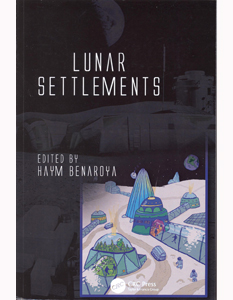Although the material in this volume dates from a four-day symposium on lunar settlements held back in 2007 and was first published in book form in 2010, this first paperback edition indicates that the topic is relevant and the material worth republishing. One of the key reasons the 45 papers within remain relevant today is the lamentable lack of progress towards human exploration and settlement of the Moon. So, for this reason alone - with appropriate adjustments made for progress in space technology - it should be of interest to anyone involved or interested in the general subject of lunar exploration.
The contents are divided into seven sections, covering the past and future, lunar development, outer space habitat design, the human condition, planning and analogues, lunar bases, and lunar soil mechanics. The volume is illustrated with black-and-white photographs and diagrams and, although it is a technical book, it should be readily accessible to all space professionals and interested amateurs.
An early chapter that summarises the content of the symposium itself is useful, but the conclusion to the summary takes one by surprise: “This was a very serious and somewhat sobering meeting”, states the writer, because the so-called ‘Vision for Space Exploration’ had “little public support”; problems with “radiation, dust and hypogravity [low-g]” had been identified; and true “settlements” may not be possible “for the foreseeable future”. He ends with: “To summarize this summary, it isn’t 1961 any more, when the lunar program was carried along on a wave of public support. So we have a lot of work to do to reignite this support”. And this too is as true today as it was in 2007.
The last 90 pages feature the original symposium schedule and the abstracts submitted, which provides a useful summary of the book’s contents. However, a big issue with this book is the lack of an index, making useful research and referencing next to impossible. It is a great pity that, having recognised the usefulness of republication, the editor and publisher failed to take the opportunity to compile an index.
Mark Williamson, Space Technology Consultant











